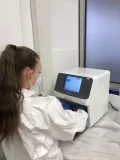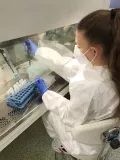Published: 09.02.2021
The student Simona Hurníková completed the Laboratory Assistant course at the Secondary Nursing School in Ústí nad Labem. Then she enrolled in the Faculty of Chemical Technology, University of Pardubice in the bachelor’s degree programme Special Chemical and Biological Programmes, field of study Laboratory Assistant. During the emergency she has been helping in the Medical Genetics Laboratories in Pardubice. Following the unsatisfactory pandemic situation, we asked her several questions.
Where exactly in the Medical Genetics Laboratories are you helping?
As mentioned in the introduction, I am working in the laboratories in Pardubice near the KOLF Health Centre, both at the collection point and in the clinical laboratory.
What made you start doing this?
Well, I completed the Laboratory Assistant course at the Secondary Nursing School in Ústí nad Labem and I thought I was experienced in lab work so I offered my help and wanted to learn more skills. Given the unsatisfactory pandemic situation and the workload on health professionals, I had absolutely no doubt about this step. I was also tempted by the opportunity to analyse the samples for the SARS-CoV-2 virus causing the COVID-19 disease, which has been for almost a year the most frequently used word in all languages of the world.
What is most interesting about the work?
I was surprised by the modern and highly specialized testing equipment of the laboratory, not only for coronavirus detection. As the name suggests, the Medical Genetics Laboratories perform clinical examination of the genetic risk of a variety of defects and hereditary diseases. Using their modern methods and approaches they can help diagnose congenital developmental defects and genetically conditional diseases including the prediction of their risk. In addition to the testing of samples for the presence of coronavirus, the laboratories focus on examining the carriage of specific hereditary diseases. The Medical Genetics Laboratories consist of a clinical genetics outpatient department and a genetic laboratory. I was very surprised by the kind approach of the team of people in the laboratory as I received a warm welcome. The comprehensive process of sample analysis, which consists of a number of consecutive steps including sampling, analysis and reporting of the results to the patients, has enriched my knowledge and skills in this area.
What were the biggest difficulties and what was easy?
The most difficult for me was to get used to wearing the protective equipment for example for five hours. Given the fact that people in the labs work with highly infectious materials, they need protective suits, respirators, shields and double gloves. It was also difficult to get used to the very fast sampling process. At the collection point, the people in the Medical Genetics Laboratories try to work efficiently to prevent queues and to handle the patients as quickly as possible. Although I work under professional supervision in the laboratory, it is sometimes difficult to process the large amounts of samples. I have to be fully focused and concentrated not to confuse the samples. Regarding the fact that I already have some lab experience from secondary school and university, it is quite easy for me to use the equipment and instruments. Also, analysing the samples by means of antigen tests and rapid tests was not difficult for me. And finally, working in this well-functioning team was a great support and motivation!
What does this experience mean to your life and your career?
In addition to sample analysis for the presence of the SARS-CoV-2 virus, I also had the opportunity to see a variety of genetic examinations, which I was very excited about and which also opened up other possibilities for my future career. Thanks to this opportunity I know that work in a genetic laboratory is something I would like to do.
I believe that the pandemic situation will finally calm down and that most of the patients will recover. Helping others makes sense and after this experience I see it as my life mission.
Simona Hurníková
Student
Mgr. Lucie Stříbrná, Ph.D.
Vice-Dean


